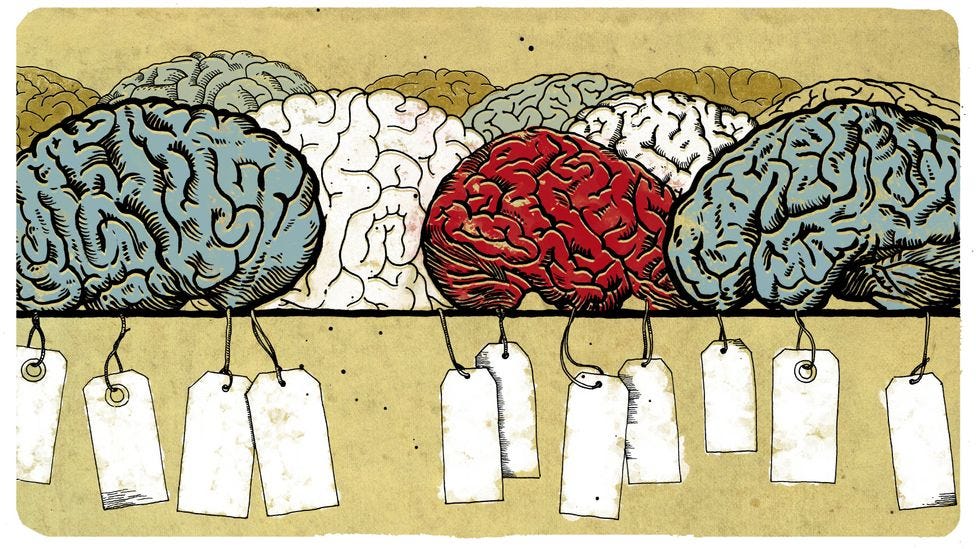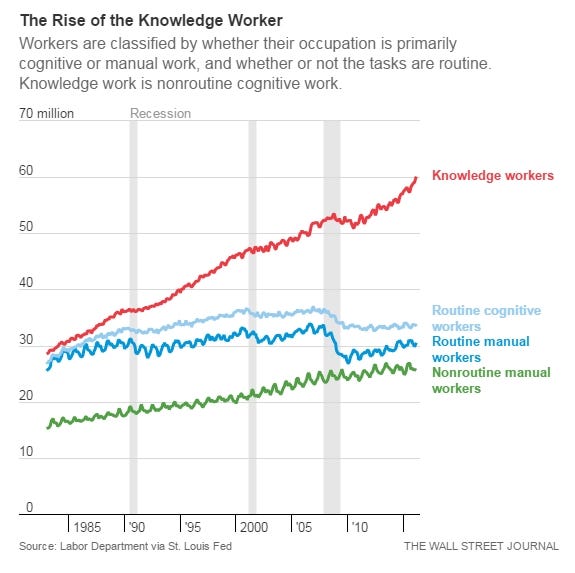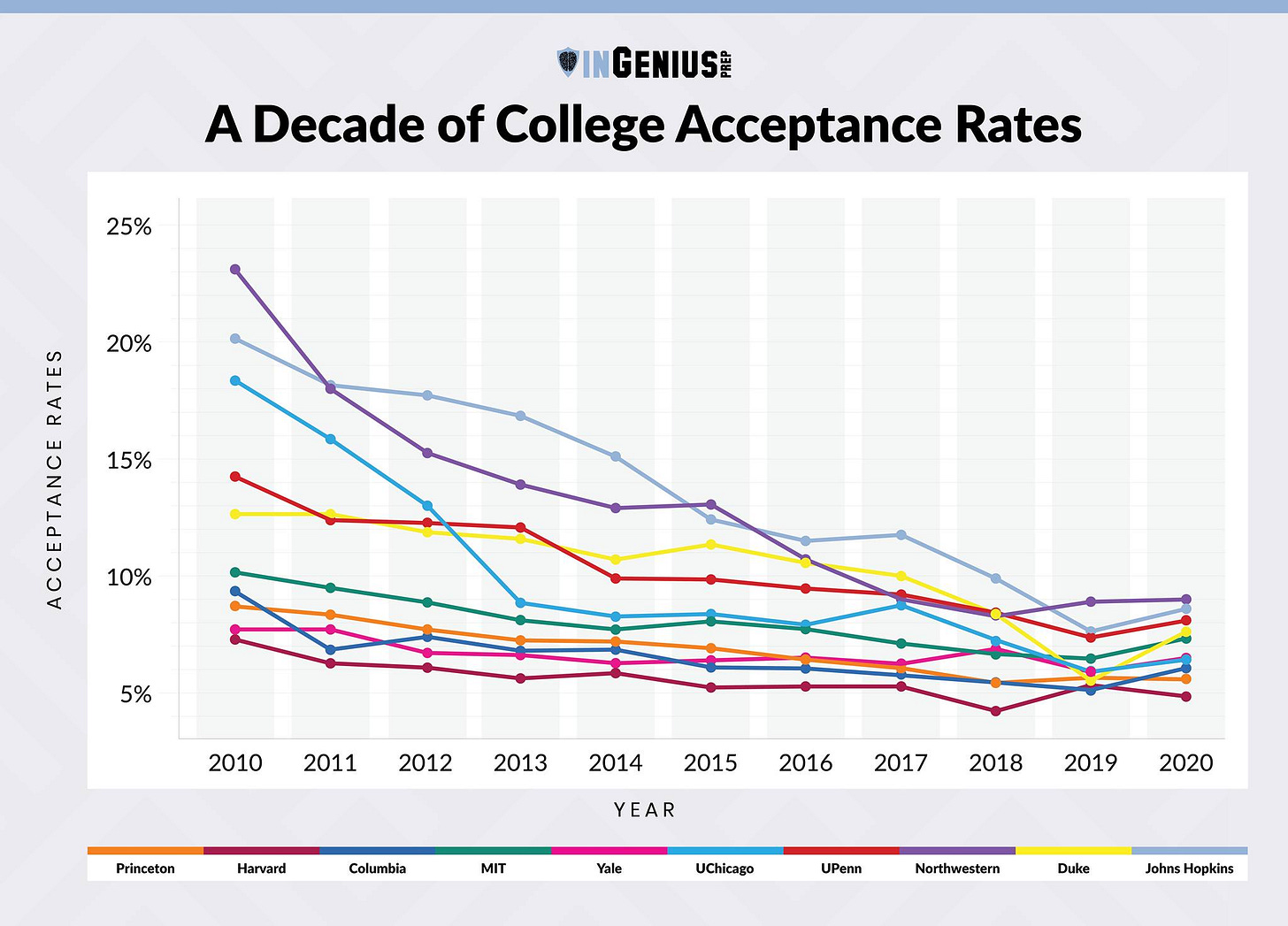Stop saying "neurotypical" and "neurodivergent:" It's inflating the productivity economy.
Tantrum Tuesday
Tantrum Tuesday
Hi, welcome to Engineering Our Social Vehicles! I’m your host, Paul Logan, and today is Tantrum Tuesday. If you’re new to the newsletter, that means that on Tuesdays ‘round these parts I like to go off on a rant about stuff that’s upset me. Today, I’m upset about two things: productivity and “neurodivergence.”
Toxic Productivity
I recently watched a YouTube video on ADHD and “toxic productivity” that I’m not going to link here because I don’t think it’s creator deserves adsense money.1 The author rambled for 20 minutes about “neurotypical” organization, efficiency, and productivity systems he had tried and failed to adopt because of his ADHD. Eventually, he proposed new systems for “neurodivergents.”
We don’t need new productivity systems. Pushing them as solutions for differences in cognition and function that should be perfectly acceptable assumes that growth and efficiency are the most important values an individual should have. Decrying “toxic productivity” and then suggesting ways to be more productive is just plain old hypocrisy, and only serves to normalize a culture of obsessive efficiency which inflates baseline expectations of productivity. This is especially damaging to anyone who might be considered “neurodivergent” that is already starting from behind.
I’m tired of the words neurotypical and neurodivergent. When researchers initially began talking about “neurodiversity” they did so with the understanding that everyone fell somewhere on the broad spectrum of phenotypic expression and that there wasn’t a “normal.” The definitions have since drifted into a dichotomy of “normal” and “not normal.” Now, the words do more harm than good by normalizing objectively abnormal behavior on both ends of the spectrum.
Show me a normal person
No one is baseline in everything. Randomness means that everyone falls somewhere within the standard distribution of motivation, attention, executive function, empathy, so on and so forth. The issue with creating a binary of neurodivergent to neurotypical is that you are taking a gradient and drawing a flat line somewhere on it, dividing everyone below the “typical” line into “factory reject” and everyone above the line into “normal function.”
This not how distributions work. Show me a binary distribution and I’ll show you a reductionist. Not even biological sex functions on a binary distribution if you look at hormone production and gene assignment. What’s more, establishing this dichotomy hides a much more insidious way of thinking in plain sight:
The language of “neurodivergence” allows mild sufferers to confuse their difficulties with the plight of the legitimately disabled.
This is the issue that Moheb Costandi, author of Neuroplasticity, called out with his 2019 piece Against neurodiversity in Aeon magazine. In the piece, Mo calls out John Marble, the founder of Pivot Diversity for a 2017 tweet:


Mo breaks down how ridiculous this claim is by looking at actual severe cases of autism like those with comorbidities, nonverbal individuals, and individuals that will never be able to function independently in society. He hits the nail on the head with this quote:
A group of marginalised people are hyper-marginalising the very people they claim to be advocating for.
ADHD and productivity culture aren’t far behind. Those who fall just inside the “neurodivergent” label have an unfortunate tendency of falling back on it as an identity. This brings with it all the negative trappings of identity politics, as we see in the tweet above.
Identifying as neurodivergent comes with inclusion into a community that offers mutual care, support, and advice. You don’t get that support by identifying as “slightly below mean productivity in knowledge work.” The label of “neurodivergent” flattens and obscures the difficulties of our most challenged. The very bottom of the distribution is mingled them with those of just-shy of the mean.
Neurodivergence as an identity is an insult to those truly debilitated by their disorders. Someone who couldn’t do homework in high school and someone whose lack of impulse control would destroy their life without corrective medication should not share the same qualifier. These are diseases; they come in forms mild moderate and severe; not “one size fits all.”
The self-diagnosis and disorder-identity crowd have made things worse for everyone by dichotomizing a normal distribution. Neurotypicals and neurodivergents in the middle of the distribution have more in common with one another than with the individuals found at the wings of the distribution with whom they share labels.
This feeds into the second reason that the language of neurodivergence hurts individuals, which is probably more insidious than the first:
Anyone at the top end of the distribution is neurodivergent as well.
This is the goose that really gets my gander about the current state of pop psychiatry and self-diagnosis. No one who is performing at the top of the Pareto distribution is going to label themselves as “neurodivergent” despite literally operating outside of the mean.
All of us are formed with slight differences, quirks, defects, and advantages. Some individuals display increased base metabolic rate in the prefrontal regions of the frontal cortex associated with executive function, attention, working memory, and fluid intelligence. These are the people who make and set goals five years in advance, and proceed to methodically and procedurally achieve them. These are the people who adhere rigidly to organization systems. Dollars to donuts, these are the people who design and popularize productivity systems.
If Jenkins is a star performer and attributes it all to his personal organization and productivity system, why wouldn’t you want to try it too? Never mind the fact that you can never compare your subjective reality with Jenkins’ and see if his brain has a more assertive pit-boss than yours. This gets into why asking successful people how they became successful is a waste of time. They don’t have the statistical analysis to know if their “reasons for success” are actually unique differentiators or are shared with the majority of failures in their field.
That video pissed me off because it perpetuates the idea that the hyper-organized are “neurotypical,” which is far from the case; they’re some of the most extreme neurodivergents our society has to offer. This is evidenced by the particular level of effect with which they seem to slice through “normal” life like butter. Normal people do not organize their lives into epics and initiatives. Normal people do not sort their email inboxes until they are empty. Normal people do not carve their lives and schedules up into discrete blocks of time with which to devote to specific goals. These are the behaviors of divergent hyper-optimizers.
Normal people do their jobs and come home to drink and watch tv. Normal people experience feelings of unease about the growing competitiveness of the world. Normal people don’t make the news for the spectacular productivity system they designed. Most of are a mixture of normal and abnormal qualities- “normality” is an illusion. I challenge you to find me a 100% normal person. Someone who isn’t divergent from the mean in some aspect of their being.
What effect does this have? A shitty one- it inflates the productivity economy.
The productivity economy
How do we judge an acceptable level of output? Let’s break out the productivity-wage decoupling EPI graph everyone loves:

Peter Drucker (who coined the term “knowledge worker”) believed that this gap was made up 100% by increasing efficiency in manual labor and didn’t cover knowledge workers— who he believed to have decreasing productivity. The problem with Druckers argument is that there isn’t general agreement on how to measure knowledge worker productivity, and so it’s difficult to say what the actual state of that productivity is.2 If productivity is increasing (and that’s a big if), it’s being accompanied by a rapid rise in knowledge work as a section of the labor market.
That’s a lot of new workers in the sector most resistant to analysis of productivity. This is an issue for employers considering not only aggressive growth in knowledge workers’ labor share but also the post-pandemic move to remote labor. Productivity software has seen steady growth in market cap as employers invest in stoking and measuring knowledge worker efficiency.
“Neurodivergence” disorders like ADHD aren’t as apparent in hands-on roles and manual labor. It’s when you sit down to accomplish ambiguous work in service of middle and long-term goals that these issues come into play. Hence why most productivity systems are aimed towards knowledge work: Inbox Zero, GTD, Pomodoro, Kanban, etc.. time and task management systems seek to remedy distractibility, amotivation, and weak executive function.
As social inequality and wage gaps grow, the determinant for one’s social class is increasingly going to come down to productivity in knowledge work. It’s my opinion that this will provoke a more competitive landscape for those seeking to enter knowledge work as an industry. For example, the acceptance rates of top universities fell continuously over the last decade:
These universities have the social license to rubber-stamp resumes as high earning, largely because they’re seen as forward filters to separate out the top 5-10% most effective individuals. When the top 5-10% of performers are lumped in with the next 50% as “neurotypical” it sets an unrealistic standard for normal performance.
To meet that standard, others have to mimic the decidedly abnormal behaviors of these top performers. This is not a “rising tide raises all masts” situation, it is a race to the bottom led by a cult of productivity that past cultures might have considered fanatical. Everyone else is forced to change in order to likewise increase their output, or risk losing their spot to someone who will.
As a bigger share of labor shifts to knowledge work for better pay, we’re going to see an increase in adoption of productivity systems not to excel but to get by. For the “neurodivergent” bottom half of the productivity distribution, these systems are not liberating revelations that increase accomplishment; they are are productivity prosthetics - requisite to bring performance to an irrationally inflated baseline.
The real dagger-twist of it all, if you believe the EPI, is that these gains aren’t even being captured by the individuals making them. People are sacrificing their sanity and free time on the altar of infinite growth and only the capital class benefits.
Conclusion: Resist
The language of neurodivergence and the cult of productivity are caustic. In combination, they set an unrealistic standard for a majority of people who shouldn’t be made to feel ashamed for the way their brain works. Even if wrapped in positive language about the benefits of having a “different” brain, the message still comes through as “be productive or be left behind.”
The onus of improvement should be on society to protect its weakest, not on impaired individuals to seek systems and prosthetics to bring their functioning up to a baseline that is unrealistic even for normal people. The more we push these systems and wrap their use in positive language and identity politics, the more we enforce an unrealistic standard of performance that benefits no one but the ownership class.
Let’s show some solidarity and slow the race to the bottom. Be less productive on things that don’t benefit you directly. Don’t work your fingers to the bone for increased revenue in a shareholder meeting. Don’t force disadvantaged peers to sacrifice just to keep pace. Break the idol of efficiency against the altar of growth.
Resist.
Alright, if you were curious enough to click on the footnote: here’s the link.
The EPI’s productivity-pay gap assertion is still debated in the literature, and there’s an entirely separate productivity debate over a “productivity slowdown.” The 1970-80 Solow Paradox has been pulled from the grave to again argue an IT based productivity slowdown for 2000-2020, but these are macroeconomic disagreements that merit their own article.











I’m a new subscriber bc of this essay. :) I have a lot of thoughts on this topic but I don’t have time to write them all out right now so I’ll stick with: this really spoke to me as someone diagnosed as Autistic as a child who often feels alienated by the dominance of adult dx/self dx voices in the neurodiversity movement (this is not a statement against the accuracy of their diagnoses only about my own feelings)
At first, it sounded to me as if you were advertising against the use of "neurotypical" and "neurodivergent" in general, but then the second half sounded as if it was the conflation with the productivity fetish that you were going against?
Anyhow, in case that wasn't the case, here's why I disagree:
I do like the term as a catch-all label for people who aren't gear-shaped like the rest of society, and I think that it's important to have something to rally under, just because of how (mentally) damaging it can be to grow up with a brain that functions differently from everyone else's. This here comes to mind: https://twitter.com/danidonovan/status/1318651281448251393
(I know I only comment here on the related topics, but I promise that it's not part of my identity other than being a nifty shortcut to describe how my brain works.)
I'm not arguing that people on the far end of e.g. the autism spectrum are infinitely worse-off than I am (I'm high-functioning, as long as I have the right pills, without them, I'm still more or less functioning). But that's what "disability" is for - right?
Let's look at something physical, since it's more clear-cut.
17 years ago, I had an almost-complete hearing loss (92%) in my left ear. Given that there were 8% left, I wasn't disabled enough to get any slip of paper - however, the disadvantages are real. (Anyone who thinks it's no big deal: grab the good ear plugs, make sure that one of your ears doesn't receive sound, and now have fun going out, or eating in a busy restaurant, or trying to follow a conversation in a noisy environment, or participating in traffic. The loss of 3-dimensional hearing is a real problem - once, I was almost hit by an out-of-control car because I couldn't spot which direction the screeching tires and the honking was coming from. I also predict that you will tire a lot faster, simply because you can't filter out unimportant noises anymore.)
However, my other ear is in supreme condition and is actually compensating for the hearing loss. In addition, I have developed a sort of tremor/pressure sense that is pretty useful sometimes when it comes to spotting disturbances, but it also makes it impossible to ignore women in high heels walking past, even if it's on the other side of a closed door. Once, I've worked in a huge corporate office - I couldn't focus for more than five minutes, because inevitably, someone would walk past with heels that made noises/vibrations that people with "normal" hearing possibly just tune out.
All this puts me in a position that's worse than that of people with two working ears, and infinitely better than that of people with 92% (or even 100%) hearing loss in both ears. I can participate in phone calls, I can watch movies or play games without subtitles, if the house is on fire, I will hear the alarms - and I don't need assistant tech to do any of that. Compared to someone who can't hear (or the severely autistic individual from your example), I'm hardly disabled! Among the blind, the one-eyed person leads...
Now, how about bats (the neurodivergent people at the upper end of the scale)? I'd assume that they have problems as well when it comes to navigating noisy environments. Maybe they perceive sounds as painful that aren't a problem for people in the middle of the bell curve. But until it becomes a problem, they'd never talk about it - maybe they aren't even aware of the fact. High-functioning bats will be like "IDK, I just have very good hearing :))" and proceed as they were. The bats with sensory processing disorders will probably sit with the hearing-impaired crowd, because at least they understand how it is to have sound-related issues.
Imagine someone with an IQ in the top 5% who did terrible at school because their attention refused to stay at the given task, and everyone told them "you're so gifted! If you'd only put in a bit more of an effort..." When they looked at themselves, they saw that it was true; they saw how everyone else just... did the things? Classmates who couldn't count to 20 without taking their shoes off had better grades at maths!
That person (me, in case that was unclear) lived in a hell of their own making, driving themselves into burnout over their bachelor thesis because "if you'd only put in a bit more of an effort..."
I can't possibly describe how liberating it was to get the first diagnosis and to be told "it isn't your personal failure, your brain is simply working differently from everyone else's". (I went to my professor and told him "I got an autism diagnosis, btw" and he was like "oh, you too?", restructured my working schedule, and I got a bachelor in computer sciences in as little time as bureaucracy would let me get away with.) I've repeatedly see people being completely mindblown when they meet others who have made the same experiences, who can tell them "It's not your lack of grit/self-control, it's not that you just have to pull yourself together, it's a real thing and others have it too".
If you shoot at the label, how should those people find each other? The system sure doesn't help them.
The problem is not the neurodivergence. The problem is that autistic individuals with well-established preferences are put into classes that they don't care for, being driven into buffer overflow instead of sitting in a corner, happily becoming the next von Neumann. The problem is that the ADHD kids are being told "if you'd only pull yourself together" instead of having a school system that actively captures their interest (have you seen an ADHD person who's interested in something? It's beautiful!)
TL;DR: The problem is the productivity economics, not the people with capitalism-incompatible brains.